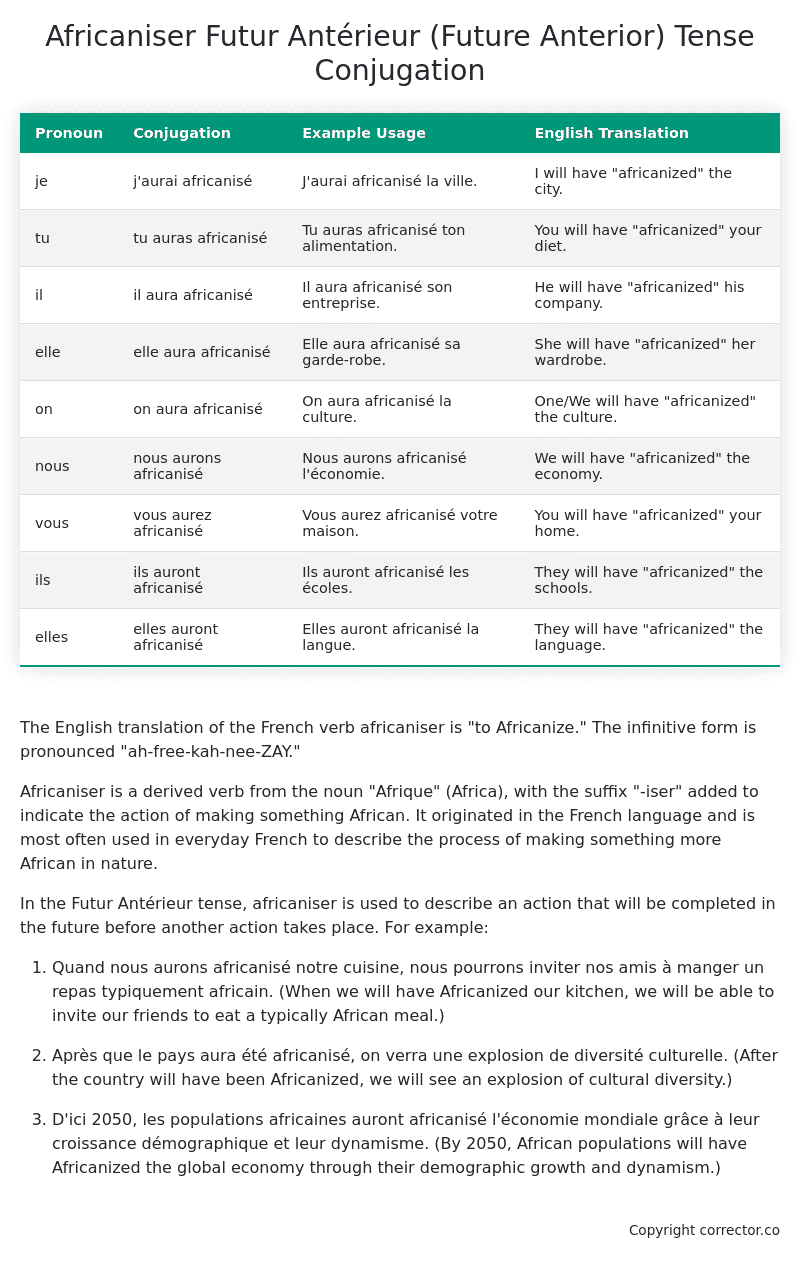Futur Antérieur (Future Anterior) Tense Conjugation of the French Verb africaniser
Introduction to the verb africaniser
The English translation of the French verb africaniser is “to Africanize.” The infinitive form is pronounced “ah-free-kah-nee-ZAY.”
Africaniser is a derived verb from the noun “Afrique” (Africa), with the suffix “-iser” added to indicate the action of making something African. It originated in the French language and is most often used in everyday French to describe the process of making something more African in nature.
In the Futur Antérieur tense, africaniser is used to describe an action that will be completed in the future before another action takes place. For example:
-
Quand nous aurons africanisé notre cuisine, nous pourrons inviter nos amis à manger un repas typiquement africain. (When we will have Africanized our kitchen, we will be able to invite our friends to eat a typically African meal.)
-
Après que le pays aura été africanisé, on verra une explosion de diversité culturelle. (After the country will have been Africanized, we will see an explosion of cultural diversity.)
-
D’ici 2050, les populations africaines auront africanisé l’économie mondiale grâce à leur croissance démographique et leur dynamisme. (By 2050, African populations will have Africanized the global economy through their demographic growth and dynamism.)
Table of the Futur Antérieur (Future Anterior) Tense Conjugation of africaniser
| Pronoun | Conjugation | Example Usage | English Translation |
|---|---|---|---|
| je | j’aurai africanisé | J’aurai africanisé la ville. | I will have “africanized” the city. |
| tu | tu auras africanisé | Tu auras africanisé ton alimentation. | You will have “africanized” your diet. |
| il | il aura africanisé | Il aura africanisé son entreprise. | He will have “africanized” his company. |
| elle | elle aura africanisé | Elle aura africanisé sa garde-robe. | She will have “africanized” her wardrobe. |
| on | on aura africanisé | On aura africanisé la culture. | One/We will have “africanized” the culture. |
| nous | nous aurons africanisé | Nous aurons africanisé l’économie. | We will have “africanized” the economy. |
| vous | vous aurez africanisé | Vous aurez africanisé votre maison. | You will have “africanized” your home. |
| ils | ils auront africanisé | Ils auront africanisé les écoles. | They will have “africanized” the schools. |
| elles | elles auront africanisé | Elles auront africanisé la langue. | They will have “africanized” the language. |
Other Conjugations for Africaniser.
Le Present (Present Tense) Conjugation of the French Verb africaniser
Imparfait (Imperfect) Tense Conjugation of the French Verb africaniser
Passé Simple (Simple Past) Tense Conjugation of the French Verb africaniser
Passé Composé (Present Perfect) Tense Conjugation of the French Verb africaniser
Futur Simple (Simple Future) Tense Conjugation of the French Verb africaniser
Futur Proche (Near Future) Tense Conjugation of the French Verb africaniser
Plus-que-parfait (Pluperfect) Tense Conjugation of the French Verb africaniser
Passé Antérieur (Past Anterior) Tense Conjugation of the French Verb africaniser
Futur Antérieur (Future Anterior) Tense Conjugation of the French Verb africaniser (this article)
Subjonctif Présent (Subjunctive Present) Tense Conjugation of the French Verb africaniser
Subjonctif Passé (Subjunctive Past) Tense Conjugation of the French Verb africaniser
Subjonctif Imparfait (Subjunctive Imperfect) Tense Conjugation of the French Verb africaniser
Conditionnel Présent (Conditional Present) Tense Conjugation of the French Verb africaniser
Conditionnel Passé (Conditional Past) Tense Conjugation of the French Verb africaniser
L’impératif Présent (Imperative Present) Tense Conjugation of the French Verb africaniser
L’infinitif Présent (Infinitive Present) Tense Conjugation of the French Verb africaniser
Struggling with French verbs or the language in general? Why not use our free French Grammar Checker – no registration required!
Get a FREE Download Study Sheet of this Conjugation 🔥
Simply right click the image below, click “save image” and get your free reference for the africaniser Futur Antérieur tense conjugation!

Africaniser – About the French Futur Antérieur (Future Anterior) Tense
Construction
Common Everyday Usage Patterns
Interactions with Other Tenses
For example
Summary
I hope you enjoyed this article on the verb africaniser. Still in a learning mood? Check out another TOTALLY random French verb conjugation!


